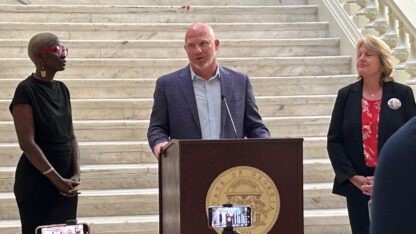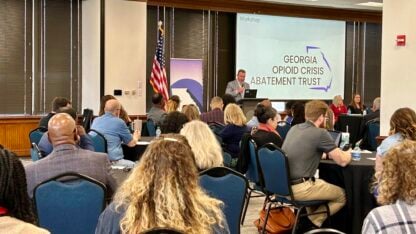Updated at 5:37 p.m.
Mady Cohen sits at her laptop in the living room of her parents’ house in Dunwoody. The junior has just returned from school, but her day is far from over. Since she launched “Mady’s Narcan Project” a few months ago, her calendar has been packed with meetings and events. Her goal is ambitious: to put Narcan in every classroom at her high school.
Narcan is a nasal spray that can reverse opioid overdoses, including those caused by fentanyl or heroin. It works by blocking the effects of opioids on the brain, temporarily.
Cohen said she started the project in May after a classmate at Dunwoody High School overdosed.
“She was in my grade. A lot of my friends were closer to her, so it was hard seeing them grieve. I literally couldn’t sleep and I just got and did my research. I called Narcan and the next day I came in with the business proposal for our principal,” Cohen said.
This year, Georgia passed a law mandating that all high schools must stock Narcan, but Cohen said the guidelines are vague — there’s no specific rule on how much should be stored, and the law only states that Narcan has to be kept at “secure places.”
Narcan needs to be administered by trained staff quickly once symptoms are recognized, Cohen said. She pointed out that having the Narcan box on the first floor of the school makes it difficult to reach those on the third floor quickly, highlighting the importance of accessibility in emergency situations.
For Mady Cohen’s classmate, Narcan came too late. She died from a fentanyl overdose at just 15 years old. Overdose deaths among young people under 30 have surged in Georgia, according to the Georgia Department of Public Health, with deaths rising by 110% for ages 15-24 and 102% for ages 25-34 between 2019 and 2021. Fentanyl, a powerful synthetic opioid, has played a major role in this increase, with fentanyl-related deaths spiking across all age groups.
Family members of a young fentanyl victim, along with state legislators, pushed for stronger overdose prevention measures in schools. Republican State Sen. Clint Dixon from Buford was one of them. For him, the bill, also known as Wesley’s Law, is essential to face the ongoing opioid crisis.
“I believe this bill will save lives, countless lives that could have been saved in recent years if we had this bill in place. As far as measuring its success — time will tell,” Dixon said.
Jeff Breedlove, strategic policy advisor at the Georgia Council for Recovery, said that expansion of the bill can’t come too soon.
For National Recovery Month in September, Breedlove and his team are traveling across Georgia on a 63-stop bus tour aimed at spreading awareness and advocating for further legislation. Breedlove noted that people sign the bus at every stop, often leaving personal notes. He said these notes can mark significant moments, such as the anniversary of a loved one’s death or the day someone found recovery, capturing powerful and emotional moments that happen at each stop.
The Georgia Recovers Bus Tour, funded by Commissioner Kevin Tanner, is the largest National Recovery Month event with 63 stops across Georgia. The tour features live music, proclamation stops, faith stops, policy discussions and celebration stops.
Earlier this month, the bus made a stop in Dunwoody, where a special guest speaker took the stage: Mady Cohen. She proudly shared the progress her project made: While her initial goal was $5,000 dollars, her Narcan project have now surpassed $11,000. Additionally, Cohen arranged for people to come in to retrain the school staff to administer Narcan.
According to the junior, another girl overdosed at her school recently, but the staff had naloxone on hand.
This time, the girl lived.









